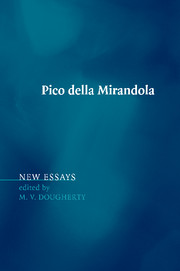Book contents
- Frontmatter
- Contents
- List of Contributors
- Pico della Mirandola
- 1 Introduction
- 2 Pico on the Relationship of Rhetoric and Philosophy
- 3 Pico, Theology, and the Church
- 4 Pico della Mirandola's Philosophy of Religion
- 5 The Birth Day of Venus: Pico as Platonic Exegete in the Commento and the Heptaplus
- 6 Three Precursors to Pico della Mirandola's Roman Disputation and the Question of Human Nature in the Oratio
- 7 Pico on Magic and Astrology
- 8 Pico's Quest for All Knowledge
- 9 A Life in Works
- Index
4 - Pico della Mirandola's Philosophy of Religion
Published online by Cambridge University Press: 08 February 2010
- Frontmatter
- Contents
- List of Contributors
- Pico della Mirandola
- 1 Introduction
- 2 Pico on the Relationship of Rhetoric and Philosophy
- 3 Pico, Theology, and the Church
- 4 Pico della Mirandola's Philosophy of Religion
- 5 The Birth Day of Venus: Pico as Platonic Exegete in the Commento and the Heptaplus
- 6 Three Precursors to Pico della Mirandola's Roman Disputation and the Question of Human Nature in the Oratio
- 7 Pico on Magic and Astrology
- 8 Pico's Quest for All Knowledge
- 9 A Life in Works
- Index
Summary
Philosophy seeks the truth, theology finds it, and religion possesses it.
In a very broad sense, philosophy may be understood as a habit of rational reflection on perspective, a process of inquiry about “viewpoint” in which basic presuppositions are discovered and examined in terms of their meaning, coherence, and justification. Philosophy is just as much about getting clear about things as it is about offering justifications for our most basic intellectual commitments. The former, of course, is a precondition for the latter. For this reason, philosophy is often thought of as the intellectual habit of asking the right sort of questions, making the right sort of conceptual distinctions, and rightly drawing out the important implications of beliefs. Understood thus, philosophy is less a particular discipline and more a way of thinking about particular disciplines. Philosophy takes on many specific forms as basic questions are raised about different domains of intellectual inquiry, such as philosophy of history, philosophy of knowledge, philosophy of mind, philosophy of science, philosophy of law, and – most relevant to the present paper – philosophy of religion.
On the above understanding of philosophy, philosophy of religion refers to a reflective habit of mind directed toward religious or theological beliefs or statements. It includes examining the meaning, coherence, and justification for religious claims as well as tracing out their implications for and relations to other aspects of human life and knowledge.
- Type
- Chapter
- Information
- Pico della MirandolaNew Essays, pp. 61 - 80Publisher: Cambridge University PressPrint publication year: 2007

